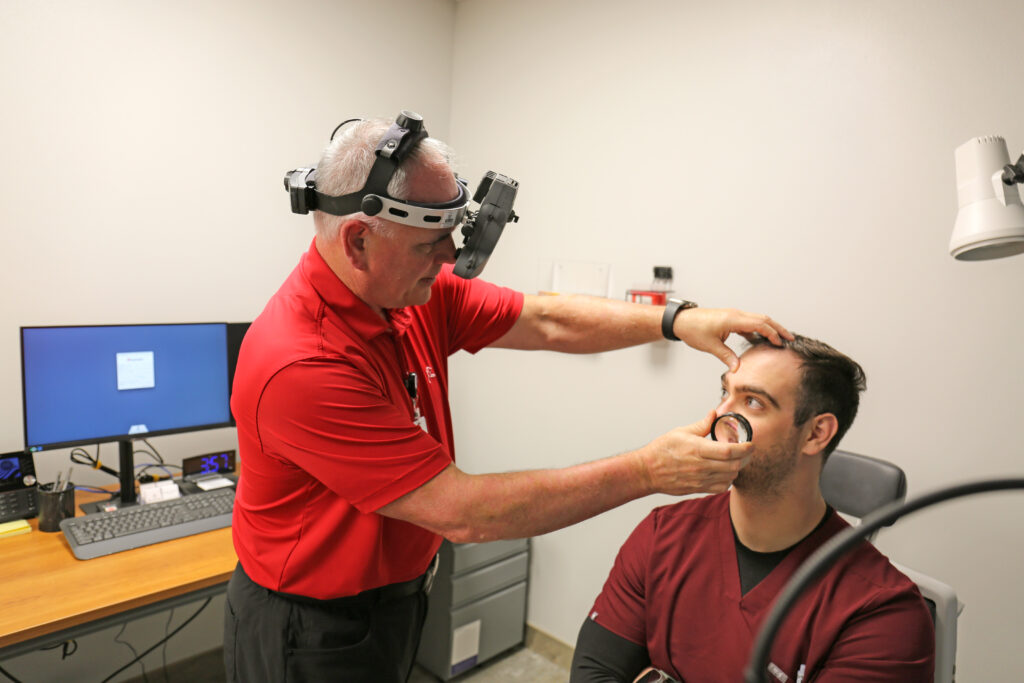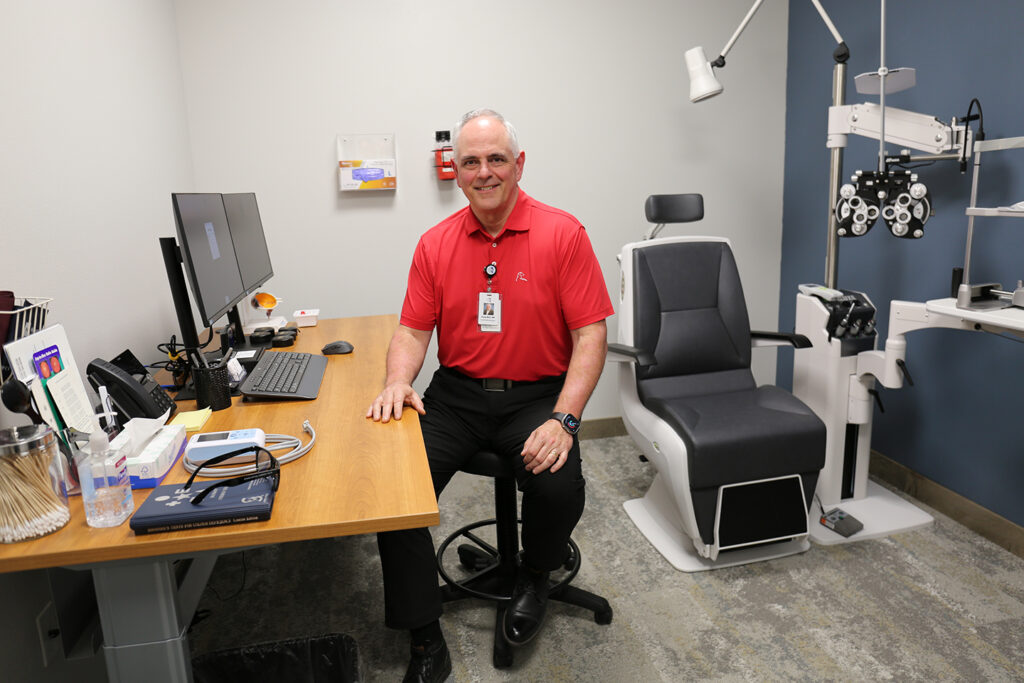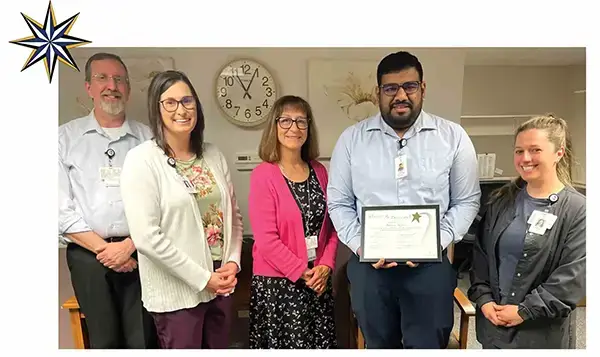
Cataract Surgery

Cataract surgery is one of the most common and effective procedures to restore clear vision for patients experiencing cloudy or blurred eyesight due to cataracts. This safe outpatient procedure replaces the eye’s cloudy lens with a clear artificial lens, helping patients regain independence and improve quality of life. Douglas Bull, MD, an experienced ophthalmologist, offers advanced cataract surgery at Reedsburg Area Medical Center.
Why Choose RAMC for Cataract Surgery in Reedsburg
When you choose Reedsburg Area Medical Center for cataract surgery, you’re trusting your vision to an experienced and caring team. Douglas Bull, MD brings years of surgical expertise and a deep commitment to serving our local community. We use advanced surgical techniques and state-of-the-art equipment that you might expect to find only in large city hospitals, but now you can access this high-quality care right here in Reedsburg.
We’re dedicated to delivering excellent results that improve your quality of life and help you see the world more clearly. Our patient-centered approach means we focus on what’s best for each individual patient we serve. From your initial consultation through your complete recovery, we support you every step of the way.
Your comfort and peace of mind are our top priorities. We take the time to answer all your questions, listen to your concerns, and create a personalized treatment plan that fits your specific needs and lifestyle. When you’re looking for exceptional eye care and trusted ophthalmology services in Reedsburg, our team at RAMC is here to provide the specialized care you deserve.
What Are Cataracts?
Cataracts are one of the most common eye conditions, especially as we age. Simply put, a cataract is a clouding of the natural lens inside your eye. Think of your eye’s lens like a window – when it’s clear, light passes through easily and you see clearly. But when a cataract forms, it’s like that window becomes foggy, making it harder for light to pass through properly.
Your eye’s natural lens is normally crystal clear and helps focus light onto the retina. As you get older, proteins in the lens can clump together, creating cloudy areas. This cloudiness develops slowly over time, which is why many people don’t notice cataracts at first.
Most cataracts are related to aging – by age 80, more than half of all Americans either have a cataract or have had cataract surgery. The good news is that cataracts are very treatable with safe, outpatient surgery that can restore your clear vision.

Understanding Cataract Symptoms
Cataracts typically develop gradually, so symptoms often appear slowly and may be subtle at first. Common signs that you may have cataracts include:
- Blurry or cloudy vision that can’t be corrected with new glasses – like looking through a dirty window
- Increased sensitivity to light and glare – bright lights seem too intense, especially when driving at night
- Halos around lights – you may see starbursts or rings around headlights and other light sources
- Faded or yellowed colors – whites may look yellowish and colors seem less vibrant
- Difficulty with night vision – harder to see in low light conditions
- Frequent prescription changes – your glasses or contact lens prescription changes often
- Need for brighter light – you require more light for reading and close-up activities
If you’re experiencing any of these symptoms that affect daily activities like driving, reading, or watching television, it’s important to have your eyes examined by an eye care professional.
Types of Cataracts
Age-related cataracts are the most common type and happen as we get older. Most people develop these naturally over time. There are three main kinds: some form in the center of your lens, others develop around the edges, and some form at the back. Each type can cause different vision problems and get worse at different speeds.
Other types of cataracts can happen for different reasons. Some people get cataracts because of health problems like diabetes or from taking certain medicines for a long time. Eye injuries can also cause cataracts, either right away or years later. In rare cases, babies are born with cataracts. Understanding the benefits of cataract surgery can help patients make informed decisions regarding their eye health.
Dr. Bull can determine what type of cataract you have during your eye exam. He helps to plan the best treatment plan for you and can explain what to expect as your cataract changes over time.
When do Cataracts Require Surgery?
Cataract surgery should be considered when your vision problems begin to interfere with daily activities and quality of life. You might be ready for surgery if you’re having trouble driving (especially at night), reading, watching television, or doing activities you enjoy due to blurry vision or glare.
There’s usually no medical urgency for cataract surgery – cataracts don’t harm your eye, and waiting won’t make surgery more difficult. This gives you time to understand your options and schedule surgery when it’s convenient for you.
The best time for surgery is when you feel your vision problems are affecting your quality of life and you’re ready for clearer vision. Dr. Bull can help evaluate whether you’re a good candidate and discuss what to expect from the procedure.
Types of Cataract Surgery Offered
When you and Dr. Bull decide on cataract surgery, you’ll have different lens options to consider, including a new artificial lens. At Reedsburg Area Medical Center, we use proven surgical techniques and offer various intraocular lens (IOL) choices. These include standard lenses and advanced options that can address astigmatism or reduce your need for glasses. Our goal is to give you the information you need to make the best decision for your vision.
Traditional Cataract Surgery: Traditional cataract surgery, also called phacoemulsification, is a safe and effective procedure that restores vision for millions of people. During lens replacement surgery, Dr. Bull makes a tiny incision in the cornea and inserts a small probe that uses ultrasound waves to break up the cloudy lens. The small pieces are then removed through suction, and a new intraocular lens (IOL) is placed through the same small opening. The IOL unfolds into place, providing better vision. This method usually requires no stitches and allows for quick recovery.
Advanced Intraocular Lens (IOL) Options: Advanced intraocular lenses (IOLs) are a major breakthrough in cataract surgery. Unlike standard IOLs, which correct vision at only one distance, advanced IOLs can greatly reduce or eliminate your need for new lenses and glasses. These premium lenses address specific vision needs and offer customized solutions. During your consultation, Dr. Bull will measure your eyes and discuss your lifestyle to help you choose the best IOL for your needs.
Some of the advanced IOL options include:
- Multifocal IOLs: Designed with different zones to provide clear vision at multiple distances—near, intermediate, and far, potentially involving replacement lenses.
- Extended Depth of Focus (EDOF) IOLs: Create a single, elongated focal point to enhance your range of vision, especially for intermediate and distance tasks
- Accommodating IOLs: Designed to move with your eye’s natural muscles, copying the focusing ability of a younger eye
Our Cataract Surgery Process
Choosing cataract surgery is a big decision, and we want you to feel confident and informed. At Reedsburg Area Medical Center, our streamlined, patient-focused process guides you from your first consultation to your final follow-up. Our team ensures your journey to clearer vision is smooth and comfortable, while also discussing the risk of complications. We start with a thorough evaluation to confirm your diagnosis and create a personalized treatment plan. We’ll explain every step of preparation, the procedure, and recovery, answering all your questions along the way.
Initial Evaluation
Your cataract surgery begins with a thorough evaluation by Dr. Bull, where we confirm the cataract is affecting your vision and assess its impact on your daily life. Dr. Bull, an experienced eye surgeon, will perform painless tests to measure your eye’s length and cornea curvature—critical for selecting the right intraocular lens (IOL) for optimal results.
This consultation is also an opportunity to discuss your vision goals and lifestyle needs, such as reducing reliance on reading glasses or correcting astigmatism. Dr. Bull will explain all IOL options and help you choose the best one for you. Please ask any questions so you can proceed with confidence.
Pre-Surgery Preparation
Once your surgery is scheduled, we’ll give you detailed instructions to prepare. Follow them closely for a safe procedure. You’ll likely need to use prescribed antibiotic and anti-inflammatory eye drops before surgery to prevent infection and reduce inflammation.
You’ll also receive guidelines about eating and drinking, typically requiring you to fast for several hours before surgery. Inform Dr. Bull of all medications and supplements you take; some, like blood thinners, may need to be stopped with your doctor’s approval.
The Cataract Procedure
Cataract surgery is a quick procedure that typically takes just 15-20 minutes and is performed on an outpatient basis. At Reedsburg Area Medical Center, our surgery team works to ensure you have a calm, stress-free experience from start to finish.
On the day of surgery, your eye will be numbed with special anesthetic drops, so you won’t feel any pain. During the procedure, the clouded lens will be removed, and you may also receive a mild sedative to help you relax. You’ll be awake during the procedure but will only see lights and colors – you won’t see the surgical instruments or feel uncomfortable.
Dr. Bull uses a gentle instrument to keep your eye open and steady during the surgery. He makes a tiny incision in your eye, carefully removes the cloudy cataract, and inserts a new clear intraocular lens (IOL). The small incision is so precise that it usually seals itself without needing any stitches. After the surgery is complete, a protective shield is placed over your eye, and you’ll rest briefly in our recovery area before heading home the same day.
Recovery Timeline Following Cataract Surgery
Recovery from cataract surgery begins right away, and most patients notice their vision improving quickly with the new replacement lens. You can return to your normal daily routines sooner than you might expect. It’s completely normal for your vision to be blurry immediately after surgery – this should clear up within a few days as your eye heals.
You’ll have a follow-up appointment with Dr. Bull soon after your surgery to check how your eye is healing and ensure full recovery. For the first week, you’ll need to use prescribed eye drops every day to prevent infection and reduce swelling. You’ll also wear a protective shield over your eye while you sleep to keep it safe. Light activities like reading or watching television are perfectly fine within a few days of surgery.
Your vision will continue to improve and stabilize over the next several weeks. Dr. Bull will schedule additional follow-up appointments to monitor your progress and ensure everything is healing properly. Most patients can return to all their normal activities, including driving, within about a week – once Dr. Bull clears you and confirms your vision meets legal driving standards.
What to Expect After Surgery
After cataract surgery, you’ll begin your recovery and start enjoying clearer vision. Recovery is usually quick, with most patients noticing a significant improvement in their quality of life within just a few days. Your eye may feel scratchy or be more sensitive to light for a few days – this is completely normal and temporary. Additionally, an eye shield is often recommended at bedtime to offer extra protection for the operated eye during the recovery process.
The RAMC team will provide you with detailed instructions for caring for your eye after surgery, including how to use your eye drops and what activities to avoid. It’s a good idea to follow these instructions closely to ensure proper healing. We’ll also schedule follow-up appointments to monitor your healing progress. Our goal is to help you return to the activities you love with renewed sight and confidence.
Vision Improvement
The improvements you can look forward to after cataract surgery are both practical and life-changing. These changes allow you to regain your independence and perform daily tasks more safely and confidently. Key vision improvements often include:
- Sharper, clearer vision without the cloudiness caused by cataracts
- Brighter and more vibrant color perception – colors will look more natural again
- Reduced glare and halos around lights, especially when driving at night
Frequently Asked Questions (FAQs)
Is cataract surgery painful?
No. Patients are given local anesthesia and mild sedation to ensure comfort.
How long is recovery?
Most patients resume normal activities within a few days, with full healing in several weeks.
Will I still need glasses?
It depends on the type of intraocular lens selected. Many patients enjoy reduced dependence on glasses.
Are there risks?
As with any surgery, risks exist, but complications are rare. Our team takes every precaution for your safety.
Meet Douglas Bull, MD
The cornerstone of ophthalmology at Reedsburg Area Medical Center is Dr. Douglas S. Bull, MD. With over 30 years of experience, Dr. Bull delivers expert, compassionate eye care to area residents of Reedsburg and other local communities. He is highly trained in diagnosing and treating a full range of eye conditions—from routine exams and glaucoma management to advanced procedures like laser retina surgery and cataract removal. With his deep expertise and commitment to patient well-being, you can trust your vision is in skilled hands.

Ready for Improved Vision?
Don’t let cataracts limit your independence or quality of life. Clear, sharp vision is closer than you think—right here at Reedsburg Area Medical Center. Dr. Douglas Bull and our dedicated eye care team are here to guide you every step of the way, from evaluation to recovery.
Contact us today at 608-768-3900 to schedule an appointment with Dr. Bull and experience comprehensive ophthalmology care that prioritizes your vision and overall well-being.






